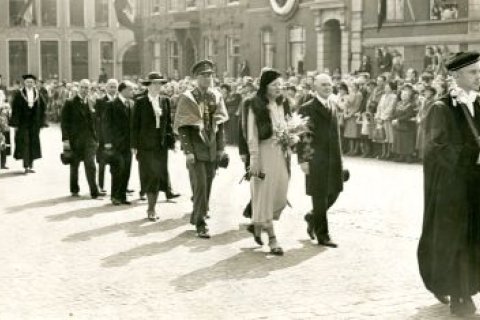Previous Dies celebrations
Every year on 26 March, Utrecht University celebrates the Dies Natalis; the anniversary of the university. This archive provides an overview of the activities during the Dies Natalis in previous years.
Dies Natalis archive (in Dutch)
Dies Natalis 1636-2000
Utrecht University was founded on 26 March 1636. Ever since then, the university celebrates the Dies Natalis every year. Information on some of these Dies Natales has been preserved, some of which is shown below.
1736: 100 years of Utrecht University
The centennial anniversary of Utrecht University was celebrated with a grand masquerade – a costumed parade with a theme. The masquerade of 1736, with Bacchus as its theme, was organised by students and was an event for all residents of the city.
For the occasion of the centennial anniversary, a medallion was minted bearing the following inscription (in Dutch): 'De zaal der vrijheid is de tempel der wijsheid; nadat de monsters bedwongen waren, zijn de kunsten herwonnen'. It has been a tradition to mint medallions at lustra ever since. By now, this has grown into a beautiful collection.

1906: 270 years of Utrecht University
During the Dies Natalis of 1948, a honorary doctorate was awarded to prof. Eleanor Roosevelt. Princess Juliana and Prince Bernhard attended as guests.

1951: 315 years of Utrecht University
For a long time, students organised the lustrum celebrations. The Utrechtsch Studenten Corps organised a masquerade and a lustrum game about Genghis Khan. Members of other student societies participated as well. An elephant walked along in the parade.
1956: 320 years of Utrecht University
For lustra, the Utrechtsch Studenten Corps was commissioned by the University Senate to organise all kinds of festivities, including a festive parade through the city. Since 1945, members of other student societies could participate in this as well. After friction came about among the student societies in 1951, the university decided to more strongly disconnect the Dies Natalis and the lustrum celebration.
In 1956, the celebration of the Dies Natalis was moved to April after all because of the Dutch vastentijd. The organisation was now assigned to a commission of the University Senate. The solemn celebration had a mixed reception in the press. The Dutch newspaper NRC spoke of a 'professors' lustrum' and 'something sterile'.
Global Ecology Problems
1983: 347 years of Utrecht University
On 18 March 1983, the 347th anniversary of Utrecht University was celebrated in the Jacobi Church.
The Dies Natalis was moved because the Dom Church was undergoing restoration at the time. The theme of the day was Global Ecology Problems. Four honorary doctorates were presented. The title of the Anniversary Speech was: 'Morrelen aan de wereld'.






